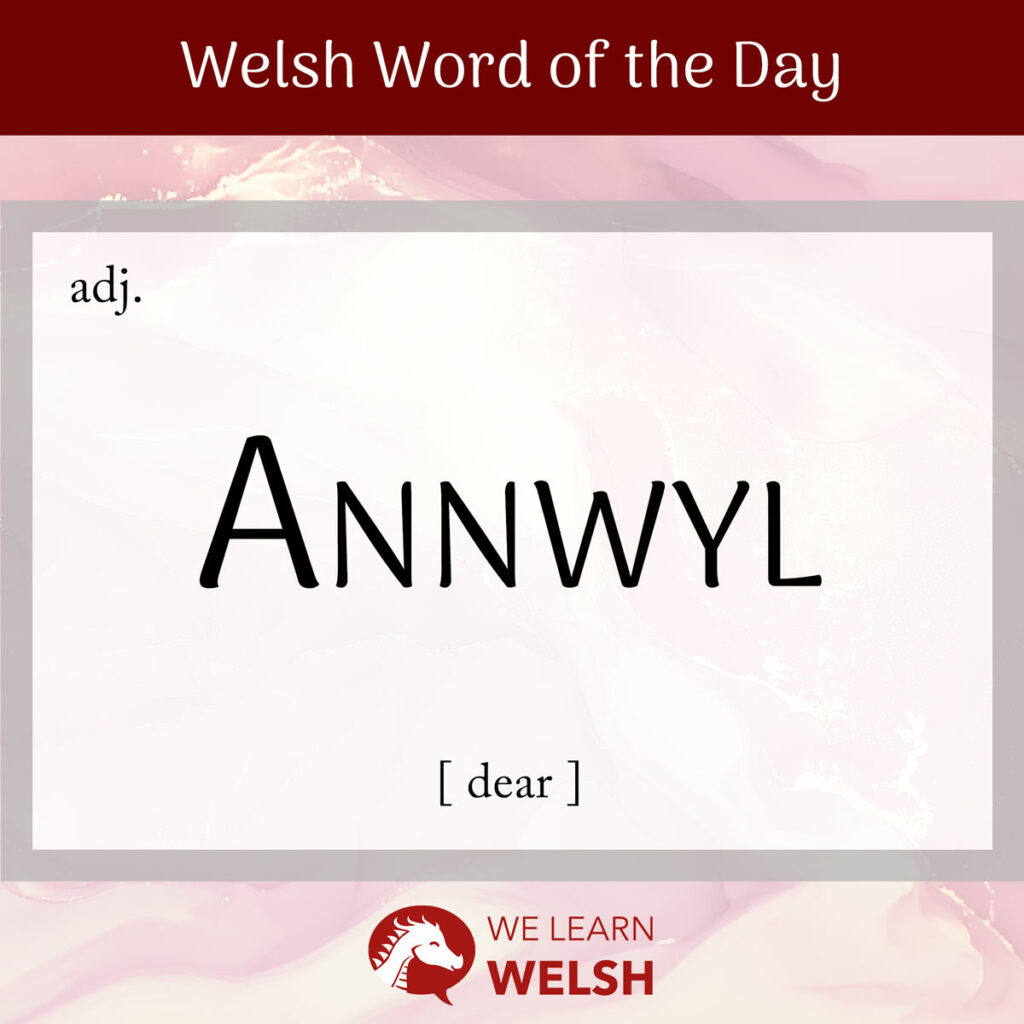When learning a new language, one of the most useful types of vocabulary to get to grips with is the kind you’ll need for ysgrifennu (writing) things like llythyron (letters) and ebostiau (emails). And that’s where today’s word of the day comes in: annwyl – which means dear, but can also carry the meaning of darling, cherished, or sweet.
annwyl
dear
Annwyl comes from the combination of the intensifying prefix an– with the word gŵyl.
You may recognise gŵyl as meaning a holiday or a festival, and you’d be right in that. But the gŵyl that appears in annwyl has a separate etymology, coming from the proto-Celtic *weilos (modest) rather than the Latin vigil (awake). Gŵyl in this sense means modest, gentle or mild, but the modern word annwyl has evolved away from these meanings to be used in a similar way to English words like dear, beloved, sweet, or darling.
It is possible in some Southern dialects to hear the word pronounced like this:
Now, you probably know that in Welsh the adjective tends to come after the noun. For example, a darling girl would be merch annwyl. And it’s a good word to have in your arsenal, since in Welsh, melys (sweet) isn’t normally used to refer to something that doesn’t literally smell or taste sweet. So you’d probably say ci annwyl instead for a sweet dog, babi annwyl for a sweet baby, and so on.
Annwyl wouldn’t be best defined as sweet – it really means dear or darling, conveying that the subject is beloved to the speaker. But we often use it when in English we would normally say sweet.
Anyway, what’s important to remember is that the word order is different when you are using the adjective to address someone.
Welsh llythyron and, today, ebostiau, are traditionally opened with the word Annwyl followed by the name of the recipient. For example, if you wanted to write to me, you would open your letter Annwyl Nia (Dear Nia), before moving on to the next line with the content of what you wanted to say.
And perhaps because of this, it’s not abnormal to place annwyl before the noun even when not writing a letter. For example, my darling brother could easily be either fy mrawd annwyl or fy annwyl frawd.

Annwyl is also the root of the verb anwylo. This is kind of like a combination of to fuss over, to cuddle, to pet and to caress.
Annwyl syr, rydych chi’n fy nghamddeall yn llwyr.
My dear sir, you misunderstand me completely.
Going back to writing llythyron, it would be possible to open a more casual missive with helo (hello) or even haia (hi). If you don’t know the name of whoever you’re ysgrifennu to you can say Annwyl Syr / Fadam (Dear Sir / Madam).
There are plenty of different ways to finish a llythyr (letter), depending on how formal you want to be. In English we have a strict difference between yours faithfully and yours sincerely, but in Welsh yn gywir (truly) is used for both cases, and is usually the best option if you are writing a physical llythyr to someone.
Cofion gorau broadly corresponds to best wishes and is a great choice for e-bostiau, as is the alternative cofion gynnes (warm regards).
Of course, if you know someone well, you can just say hwyl (bye) before signing off your name. Pob hwyl (all the best) is a good option because it captures the friendliness of hwyl whilst feeling a little more formal and polite.
Other phrases that might be handy in writing llythyron and e-bostiau include:
- cyn gynted â phosib = as soon as possible
- diolch am eich llythyr = thank you for your letter
- diolch ymlaen llaw = thanks in advance
- yn dilyn eich neges = further to your message
- gweler ynghlwm = see attached
- anfonwch yn ôl at = return to
- mae croeso i chi gysylltu â mi = you’re welcome to contact me
- mae’n ddrwg gen i = I’m sorry
In terms of the physical format and spacing you can use the same conventions you would in English.
Roedd ganddi hi ddoli fach annwyl yr oedd hi’n ei dwlu arni.
She had a sweet little doll that she was very fond of.
Annwyl is also used in a variety of traditional Welsh exclamations. You can just exclaim yr annwyl! which is a bit like oh dear me!, but perhaps more common are Tad annwyl! (dear Father!), yr argoel annwyl! (the dear Lord!), yn enw’r annwyl! (in goodness’ name!), nefoedd annwyl! (dear Heavens!) and brenin annwyl! (dear king!)
These all come from an implication of yr annwyl (literally the dear or the beloved) referring to the goodness of Duw (God).
Sadly, idiomatic expressions and exclamations like this are becoming less common in modern Wales, in favour of literal translations from English. Making an effort to use them is one way in which we can all help keep the unique features of the Welsh language alive.

